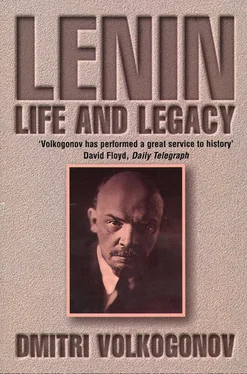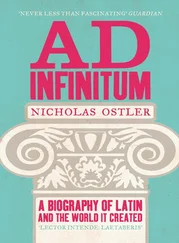Savva’s nephew, Nikolai Pavlovich Schmidt, owned a large furniture factory in Moscow, and also supported the social democrats. During the armed uprising in Moscow in December 1905 he was arrested for supporting the ‘insurgents’, and in February 1907, aged twenty-three, he killed himself in prison in suspicious circumstances. It is still unclear why he should have done this, just before he was to be released on his family’s surety. In any event, he left part of his estate to revolutionary causes, although not exclusively to the Bolsheviks. According to the law, his estate should have gone to his two sisters, Yekaterina and the sixteen-year-old Yelizaveta, and a younger brother, but then two of Nikolai’s young Bolshevik acquaintances, Nikolai Andrikanis and Viktor Taratuta, entered the scene.
It seems that these two had been deputed to ensure that Nikolai’s money came to the Bolsheviks. Their assignment was to court, conquer and marry the girls, nothing less. Taratuta, whom Lenin knew well, and his comrade performed their rôles to perfection, and both girls were swept away by the romance of ‘preparing for revolution’ in Russia. Soon, however, Andrikanis began having second thoughts about handing over the inheritance to the Party. Lenin wrote (the text in the archive is in the hand of Inessa Armand) that ‘one of the sisters, Yekaterina Schmidt (married to Mr Andrikanis), questioned giving the money to the Bolsheviks. The conflict was settled by arbitration in Paris in 1908, with the good offices of members of the Socialist Revolutionary Party … The judgment was that the Schmidt money should go to the Bolsheviks.’ 149 In 1909 the two newly married couples arrived in Paris.
Andrikanis, however, would only part with a small amount. When it was decided that he should be ‘tried’ by a Party court, he simply left the Party, which had to be content with the crumbs ‘Person X’, as he was codenamed, had deigned to cast its way. 150 In order to act before the funds of the younger sister, Yelizaveta (who was still a minor, and whose financial affairs were in the hands of a trustee), were also cut off, a session of the Bolshevik Centre was held in Paris on 21 February 1909. Zinoviev, who took the minutes, recorded: ‘In January 1908 Yelizaveta X told the Bolshevik Centre … that in carrying out her brother’s will as correctly as possible, she considered herself morally obliged to give the Bolshevik Centre the half-share of her brother’s property that had come to her legally. That half, which she inherited by law, includes eighty-three shares in Company X and about 47,000 roubles of available capital.’ The document is signed by N. Lenin, Grigorii (Zinoviev), Marat (V. Shantser), V. Sergeev (Taratuta), Maximov (A. Bogdanov), Y. Kamenev. 151
It was agreed that the money should be transferred after sale of the shares. In November, Taratuta and Yelizaveta came back to Paris and handed Lenin more than a quarter of a million francs. By now the Bolsheviks had received more than half a million francs, as documents written and signed by Lenin indicate: ‘In accordance with the decision and calculations of the executive commission of the Bolshevik Centre (plus the editorial board of Proletarii ) of 11 November 1909, I have received from Ye. X. two hundred and seventy thousand nine hundred and eighty four (275,984) francs.’ 152 He issued a receipt to Yelizaveta and Taratuta, stating: ‘We, the undersigned, acting in the matter of the money with power of attorney from Comrade Vishnevsky, in concluding the case conducted by the entire Bolshevik Centre, and in taking over the remainder of the money, accept before you the obligation to answer to the Party collegially for the fate of this money. Signed N. Lenin, Gr. Zinoviev.’ 153
This was not the end of the affair. After various vain attempts to reunite the Party, the Mensheviks raised the question of uniting the Party funds. The question was, who was to control the capital, which of course contained more than just the Schmidt inheritance. After long and heated argument, it was agreed in 1910 that the Party’s resources be handed over to three depositors, the well-known German social democrats Clara Zetkin, Karl Kautsky and Franz Mehring, and in due course a substantial part was deposited in a bank under their names. But the reunification turned out to be a fiction, with the Party carrying on its in-fighting as before. The trustees found themselves pressured and accused by both wings of the Party, as only they had the authority to disburse the money. Lenin demanded they hand all the money back to the Bolshevik Centre. Kautsky replied, on 2 October 1911: ‘Comrade Ulyanov, I have received your letter. You will receive a reply once I have consulted Madame Zetkin and Mr Mehring. You probably know that he has retired as a depositor owing to illness. As a result of this, the depositors can take no decision if there is a difference of opinion.’ He added a postscript: ‘My work is suffering from the great waste of time and energy spent on this hopeless matter. Therefore I can no longer continue my functions. With Party greetings, K. Kautsky.’ 154
Clara Zetkin tried to break the deadlock by suggesting that all the money be returned as the property of the entire Party. A tug-of-war ensued, involving lawyers, long drawn-out correspondence, and caustic comments addressed to the depositors. In a letter to G.L. Shklovsky on Zetkin’s position, Lenin wrote: ‘“Madame” had lied so much in her reply, that she’s got herself even more confused …’ 155 The case went to court, and a typical letter from Krupskaya, written on 23 May 1912 under Lenin’s instructions, to their lawyer, a certain Duclos, reads:
Sir,
My husband, Mr Ulyanov, has left for a few days and has asked me to acquaint you with the enclosed documents. A letter from the three depositors dated 30 June 1911. A memorandum from the manager of the National Bank’s agency in Paris dated 7 July 1911 concerning the despatch of a cheque to Mrs Zetkin for the sum of 24,455 marks and 30 Swedish bonds. A decision of the RSDLP of January 1912 concerning the sum held by Mrs Zetkin.
Signed N. Ulyanova.’ 156
Zetkin held her ground, handing out some money for various meetings, and the row only subsided after the First World War had intervened. The money at issue, however, was the smaller part of the Schmidt inheritance, the greater part having remained all the time in the hands of the Bolshevik Centre, i.e. Lenin’s, as the chief controller of the Party’s finances. In August 1909, for instance, he sent an order to the National Discount Bank in Paris to sell stock held in his name and to issue a cheque for 25,000 francs to A.I. Lyubimov, a member of the Bolshevik Centre. 157 Thus, the true ‘depositor’ of the Party funds was Lenin himself, and to a great extent the Bolsheviks in emigration depended financially on him.
The Mensheviks, fully aware of the murky background of the Schmidt affair, tried to depict Taratuta as a ‘Party pimp’ who was securing Lenin’s finances by sleazy methods. When Taratuta complained about attacks on him by Bogdanov – another member of the Bolshevik Centre, but by now Lenin’s rival – Lenin secured a special resolution of the Bolshevik Centre, amounting to a Party indulgence and emphasizing that what had happened ‘in no way evokes the slightest weakening of the trust the Bolshevik Centre has in Comrade Viktor [Taratuta]’. 158 After 1917 Taratuta continued to enjoy Lenin’s trust and confidence.
Lenin had other sources of funds beyond Morozov, Schmidt and Gorky. In 1890, for example, he had met A.I. Yeremasov, a young entrepreneur from Syzran in the province of Simbirsk, who had been involved with local revolutionary circles. 159 At the end of 1904 Lenin asked him to help fund the Bolshevik newspaper Vpered in Paris. 160
Читать дальше












